Your transmission is slipping. Even if you have no idea what that means, it just sounds bad, doesn’t it?
In the simplest terms, a car transmission is a gearbox. If you think of the gears and chain on your bicycle, that’s a good place to start.
The parts of a transmission are connected to the engine so that the gear and belt system effectively respond to the power produced by the engine, providing the transmission with momentum.
When you turn the key to start the car, fuel ignites in the combustion chamber. As it ignites, gas and heat expand and push pistons inside the engine’s cylinders. As they move up and down, they spin the engine’s crankshaft. This in turn connects and moves the wheels.
Most transmissions have five or six sets of gears and gear trains (belts or chains) that help a driver operate the vehicle at different speeds. As power moves based on how much gas you give it, the gears move accordingly. Without the transmission, the entire start and stop movement wouldn’t be possible.
How a transmission works
Cars will have a manual or automatic transmission. The only difference between the two is how much participation a driver has in the process. With a manual transmission, the driver pushes a clutch to engage the clutch plates and gear levels, then moves into the desired gear. An automatic transmission has an automatic clutch that performs each movement based on how fast you’re driving.
A gear lever selects and moves gears to connect with the appropriate gear. When engaged, this gear level moves a clutch plate into position to connect with larger gears. This process continues to change and shift gears based on your speed and actions, delivering power from the engine to each of the wheels.
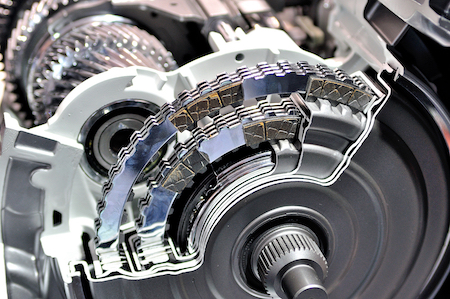
Each gear is shaped with teeth to fully engage as they move. If you hear the engine making a horrible grinding sound, it may be because the clutch plate doesn’t align properly with the gear teeth. While it might be easier to hear if you’re driving a manual transmission, you still can’t ignore the grinding sound as it tries to engage while moving into a higher gear.
What does it mean when your transmission is slipping?
When a transmission is slipping, it can feel like the vehicle is slow in response time. When you press down on the accelerator, nothing happens. It may or may not be accompanied by a noise, such as a clunk, similar to what happens when it changes gears. You may also notice it while driving at a consistent speed, it suddenly slips into a different gear. This can be caused by several things:
- Fluid – a transmission operates with transmission fluid to keep the gears well lubricated. If the levels are too low, or there is grime and dirt in the transmission fluid, it might prevent the gears from moving as they should.
- Gears – gears work together with teeth grips, connecting with each other as they go around. If those teeth are worn down or contaminated, they may not fully connect and grip.
- Transmission bands – these internal bands are used to engage and disengage the gears. Over time, these can wear down and become less effective.
- Solenoid – this controls fluid distribution. If the proper levels of fluid aren’t circulating, it impacts every part of the system.
- Torque converter – this is the connector piece between the transmission and engine. If it fails or doesn’t operate correctly, the transmission will not operate as designed.
Most transmission slippage problems are from low or worn out transmission fluid
It’s the number one reason vehicles experience transmission slippage. Luckily, it’s also an easy problem to fix.
Most manufacturers suggest replacing transmission fluid every 30,000 to 60,000 miles. Considering transmissions need full replacement around 100,000, that equates to two or three changes before it’s time for a new transmission. Depending on how much you drive each year, that could signal new transmission fluid should be checked and changed every two to three years.
Depending on how your transmission is designed determines how easy the process is. Many systems are completely closed and require professional servicing. Transmission fluid is typically translucent and dark red when new, but will grow even darker as contaminants are introduced.
Like motor oil, transmission fluid can be checked with a dipstick. Pull it out from the filler tube and look at the color. Transparent red means it’s like new. Dark brown signifies it’s time for a fluid and filter change. If it appears light pink, it signifies water or coolant has made it into the system. It’s time for a rebuild or repair.
Can you drive with a slipping transmission?
When trying to decide whether to continue to drive, think about all the things that might be wrong.
If it’s leaking transmission fluid, what’s happening internally without proper fluid levels?
If it’s making a funny noise, how are all the parts interacting?
If you feel the car not engaging at different speeds, does it put you at risk while out on the road?
Can you drive with a slipping transmission? Technically, the answer is yes.
Yet driving with a bad transmission will definitely put you and your vehicle at risk.
Continue to drive, and the damage may escalate. What might have been stopped with a minor repair can quickly escalate.
And if gears slip and won’t engage to help you keep your vehicle under control, it can put you at greater risk for an accident.
If you’re unsure of how bad your transmission problem is, inspecting it will pinpoint the issue and get you back on the road safely once again.
Stop by today and let us inspect your vehicle. We’re here to run diagnostics and fully check your issue to get to the heart of the problem. We’ll help you determine what’s wrong with your vehicle, find a solution, and keep your car operating as efficiently as possible.
Is your car experiencing transmission slippage?

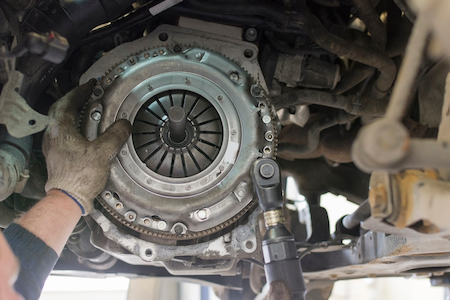
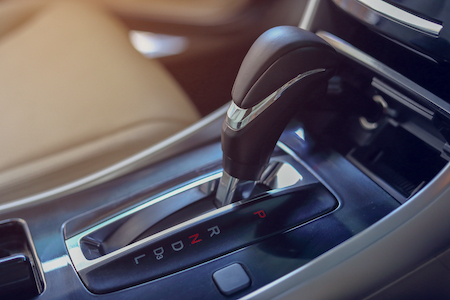
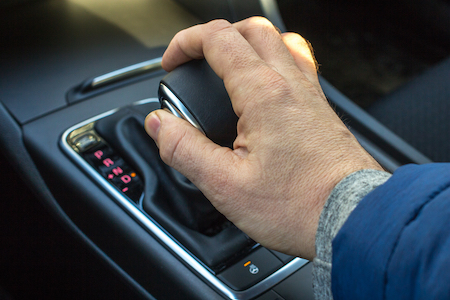
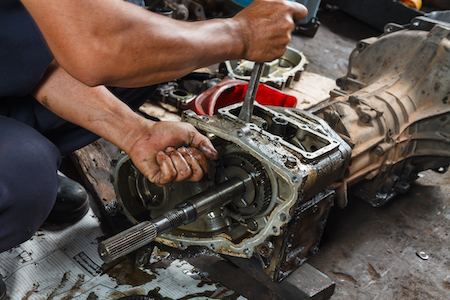
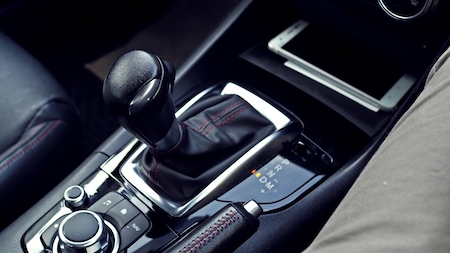 A manual transmission relies on you to operate the clutch and shift as needed.
A manual transmission relies on you to operate the clutch and shift as needed. It’s very easy to forget about servicing your transmission because it doesn’t need it very often, but when you change your transmission fluid it keeps your vehicle running smoothly and helps you avoid costly repairs down the road. Your transmission undergoes a lot of stress. The grit you see in used fluid is actually bits of clutch material. This grit flowing through your transmission under pressure eats away at seals and gaskets which can lead to leaks. The transmission operates at very high temperatures – much higher than engine temperatures. Those high temperatures eventually cause the transmission fluid to start to break down and loose efficiency. At best, your transmission won’t operate smoothly. At worst, it could lead to very costly damage. When you change your transmission fluid and it’s running properly, it transfers more power from your engine to the drive wheels and improves fuel economy. That’s why manufacturers have recommended changing your transmission fluid at regular intervals. Your owner’s manual has a schedule for transmission service and, of course, your Express Car Care service adviser can tell you what the manufacturer recommends. At Express Car Care, we are able to perform a transmission service while you wait and the cost is usually quite reasonable. When you think about how much a major transmission repair can cost, the cost to change your transmission fluid with our transmission service is downright cheap. Come on in or give us a call and let us know what we can do to help you keep your car on the road.
It’s very easy to forget about servicing your transmission because it doesn’t need it very often, but when you change your transmission fluid it keeps your vehicle running smoothly and helps you avoid costly repairs down the road. Your transmission undergoes a lot of stress. The grit you see in used fluid is actually bits of clutch material. This grit flowing through your transmission under pressure eats away at seals and gaskets which can lead to leaks. The transmission operates at very high temperatures – much higher than engine temperatures. Those high temperatures eventually cause the transmission fluid to start to break down and loose efficiency. At best, your transmission won’t operate smoothly. At worst, it could lead to very costly damage. When you change your transmission fluid and it’s running properly, it transfers more power from your engine to the drive wheels and improves fuel economy. That’s why manufacturers have recommended changing your transmission fluid at regular intervals. Your owner’s manual has a schedule for transmission service and, of course, your Express Car Care service adviser can tell you what the manufacturer recommends. At Express Car Care, we are able to perform a transmission service while you wait and the cost is usually quite reasonable. When you think about how much a major transmission repair can cost, the cost to change your transmission fluid with our transmission service is downright cheap. Come on in or give us a call and let us know what we can do to help you keep your car on the road. Everything we discussed above that comes equipped with a front-wheel drive car is reversed with a rear-wheel model.
Everything we discussed above that comes equipped with a front-wheel drive car is reversed with a rear-wheel model. The automatic transmission is by far the most popular on new car models today. But the manual transmission is simpler to understand, and you’ll still find it a popular choice in sports cars or off-road vehicles that want more control over how they shift and drive.
The automatic transmission is by far the most popular on new car models today. But the manual transmission is simpler to understand, and you’ll still find it a popular choice in sports cars or off-road vehicles that want more control over how they shift and drive.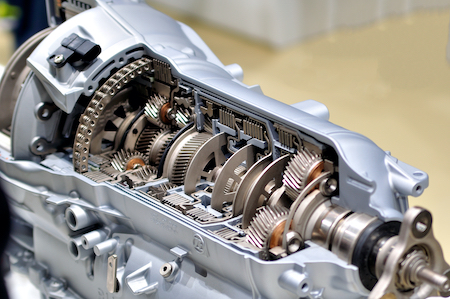 Another thing you might notice is that your vehicle’s transmission tends to impulsively slip in and out of place. This can be highly dangerous if you’re on a busy road and your gears slip. Imagine flying down the highway from a day up skiing, and your gears slip to neutral. If you feel this at any point, bring it in to have it evaluated as soon as possible.
Another thing you might notice is that your vehicle’s transmission tends to impulsively slip in and out of place. This can be highly dangerous if you’re on a busy road and your gears slip. Imagine flying down the highway from a day up skiing, and your gears slip to neutral. If you feel this at any point, bring it in to have it evaluated as soon as possible.